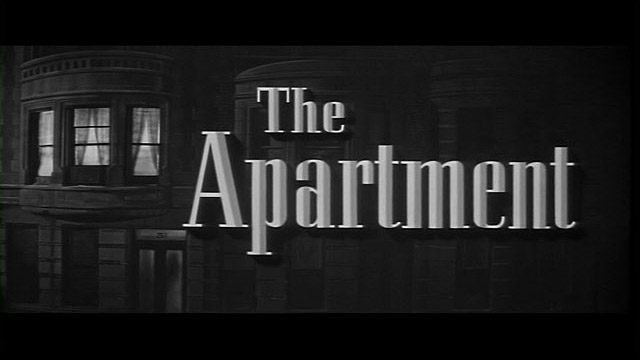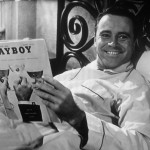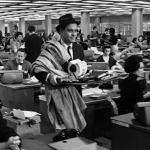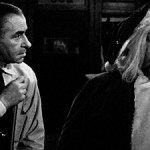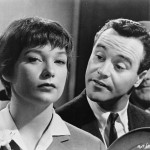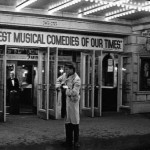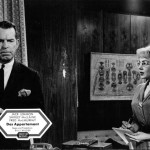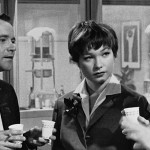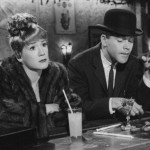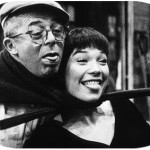You may not associate Jack Lemmon with genius, but he achieved a great deal in his own inimitable style. He may not have been Hollywood’s idea of the perfect teen matinee idol either but he forged a brilliant career (laden with two Academy Awards and a string of other gongs and nominations) on the strength of mercurial charm, comic timing, honed character acting – even though Billy Wilder regarded him as a ham.
More than this, he had a quality far more elusive: he was an everyman with whom any Joe who happened to walk into a movie theatre from the rain could identify; he had the knack of speaking your thoughts, be it in comic or straight roles. He was every bit as brilliant in Save the Tiger, The China Syndrome and Glengarry Glen Ross as he was in The Odd Couple and a dozen more legendary comedies, in spite of his naturalistic style of acting.
Lemmon used these qualities to great effect in Some Like It Hot, and was cast again in a leading role in Billy Wilder‘s next film, The Apartment, which went on to win five Oscars of its own. This script co-written by Wilder with his long-time associate IAL Diamond, but the product was very different – albeit still in black and white, a rarity by the 60s.
Where SLIH was a nostalgic farce, Wilder, here at the top of his game, took on a bittersweet comic romance that verged on the cynical. Themes include adultery and suicide were cutting edge, if not taboo in 196o, but Wilder faced them head on rather than downplaying the controversy and making the light frothy romcom it might have been in other hands. If that sounds dour, don’t be fooled – there is nothing so leaden about The Apartment – in fact audiences and critics alike took it to their hearts. From Wikipedia:
The initial concept for the film came from Brief Encounter by Noël Coward, in which Celia Johnson has an affair with Trevor Howard in his friend’s apartment. However, due to the Hays Production Code, Wilder was unable to make a film about adultery in the 1940s. Wilder and Diamond also based the film partially on a Hollywood scandal in which high-powered agent Jennings Lang was shot by producer Walter Wanger for having an affair with Wanger’s wife, actress Joan Bennett. During the affair, Lang used a low-level employee’s apartment. Another element of the plot was based on the experience of one of Diamond’s friends, who returned home after breaking up with his girlfriend to find that she had committed suicide in his bed.
The cynicism comes from the basic premise of the plot, namely that middling clerk and office drudge CC “Bud” Baxter (Lemmon) works for a big insurance company but can only gain advancement by allowing middle managers further up the greasy pole to use his rented apartment for trysts with their mistresses in exchange for glowing reports – evidently at a time when company drones could neither afford nor risk hotel rooms.
In this respect, I thought of Malcolm Bradbury‘s splendid satire Rates of Exchange, since the premise of the movie relates strongly to the equation between what it’s worth to gain your worth, and whether how you acquire your ill-gotten gains matter as much as your integrity – or, indeed, matter at all if you have found your soul mate.
Sadly for Baxter, his über boss, director Jeff D Sheldrake (Fred MacMurray) sees his game, wants to join the club (or rather hijack the game for his exclusive benefit), and to seduce the elevator girl, Fran Kubelik (Shirley MacLaine), to whom Baxter is quietly devoted. Things take a further turn when Sheldrake refuses to commit to her, just as he abandoned a string of previous mistresses, leaving Kubelik to take a stomachful of sleeping pills – and Baxter to pick up the pieces, at no small cost to himself – and negotiate with Sheldrake.
The casting reflected the tone of the subject matter and the movie. It is very noticeable that Monroe‘s Sugar Kane was superseded as female lead by a young MacLaine – great piece of casting since the role required not only cuteness but gutsy, tragic qualities, those which Monroe reserved for her private life. It is MacLaine who cuts through the risk of Hollywood schmaltz at the end when Baxter declares his love for her. From Wikipedia again:
…her reply is the now-famous final line of the film: “Shut up and deal”, delivered with a loving and radiant smile.
But ultimately it’s not the plot that charms you so much as the chemistry between Lemmon and MacLaine, and Wilder allowing just enough leeway for an unspoken feeling to blossom. As Rotten Tomatoes puts it:
“Director Billy Wilder’s customary cynicism is leavened here by tender humor, romance, and genuine pathos.”
A true comedy can’t survive without pathos, but you have to treat pathos with care – a little can go a long way. Thankfully, this is where Lemmon comes into his own, he being an actor naturally blessed with the art of turning comedy on its head to reveal the sad inner truth, the tart poignancy inherent within the role of CC Baxter. I truly doubt there was another actor alive at the time who could have understood the concept better, to have gotten under the skin of humour growing from within the depths of a mournful soul.
So from that base, imagine just how logical it is, with the benefit of hindsight, that Sam Mendes watched the Apartment in preparation for making American Beauty, a movie building upon the satire and pathos Wilder created. Even more fitting that Kevin Spacey, dedicated his best actor Oscar to Lemmon’s performance – and from one great actor to another, that is praise indeed.

